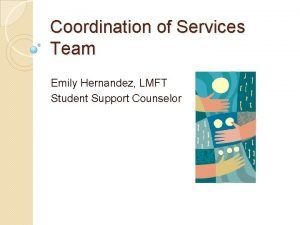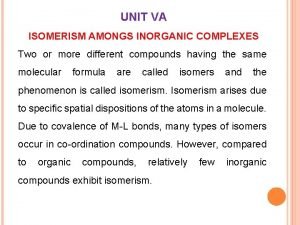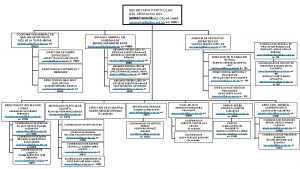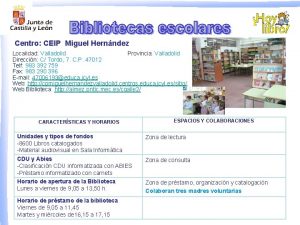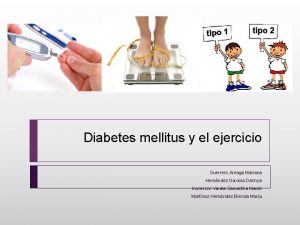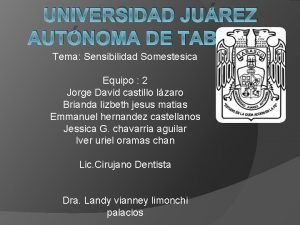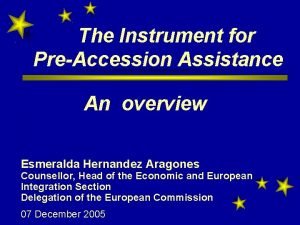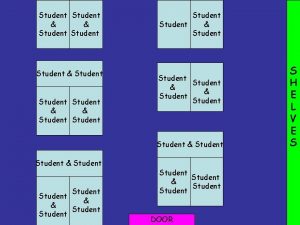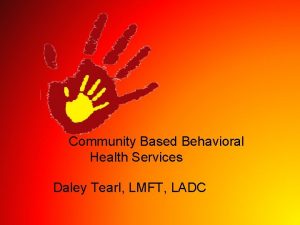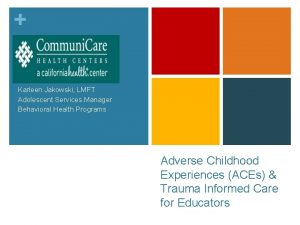Coordination of Services Team Emily Hernandez LMFT Student


















- Slides: 18

Coordination of Services Team Emily Hernandez, LMFT Student Support Counselor

MISSION Our mission is to: • coordinate the provision of support resources available at TAS/WAHS; • avoid duplication of services, • maximize our efforts in addressing all of our students needs and to • maintain to do so. clear documentation of our efforts

What is COST? A multidisciplinary team that is coordinated to systematically identify at-risk students, develop comprehensive multidisciplinary intervention plans, and regularly monitor student progress.

Why have COST? � Collaborative coordination of services � Personalization � Prevents � Avoids fragmentation of services duplication of intervention � Effective � Focuses delivery of services available on the best use of resources and provides a management system for intervention

FUNCTIONS OF COST �BIG PICTURE ISSUES ◦ data review, school-wide problems, gap analysis �IDENTIFICATION OF STUDENTS ◦ data, screening, anecdotal evidence, referrals �INTERVENTIONS ◦ triage, referral to program/person, strategies �MONITORING/DOCUMENTATION ◦ case management, data collection, evaluation

Adapted from Sprague & Walker, 2004 3 Tiered Approach to Intervention *Intensive Interventions *Increased Frequency and Duration Targeted/ Intensive (3 -5%) *SST Meetings *Additional Follow-up SST Meetings *Case Management (High-risk students) Individual Interventions Selected (At-risk Students) Classroom, Family, & Small Group Strategies *Team Meetings (COST) *Individual Student Plans *Instructional Supports *Documentation & Monitoring (10 -20% of students) Universal (All Students) School-wide, Culturally Relevant Systems of Support (75 -85% of students) *Incentive Programs *Clear Expectations *Positive School Climate *Instructional program * Asset Building

Differences Between… COST and SST COST Immediate response Identifies interventions Provides access to student support Monitors initial interventions Used to focus limited resources available Coordinates support services SST Strength based approach A comprehensive individualized plan is developed Involves student and family Intensive tracking & monitoring

Referral Reasons Academic Behavioral Attendance Social Data Emotional Tracking

Centralized Referral System �One Centralized Referral for entire School �COST serves as a “Triage Center” for all school support/intervention services �Why? ◦ Centralized ◦ Documentation ◦ Accountability

Do we still refer to the dean? �YES. You should follow the school protocol for disciplinary referrals. �**Students are not to be referred to COST for discipline. You may find that a student has not responded to deans’ efforts and he/she presents chronic misbehavior. At this point you may refer to COST (most likely the dean would have already made a referral based on interactions with the same student)

Crisis Situations Mental Health emergencies (selfinjurious behavior, trauma, suicidal/homicidal ideation, death) should be reported immediately to school site crisis team or administrator. As a follow up, this student should be referred to COST to document school response and refer to additional services.

COST PROCESS Admin Dean Academic SS Counselors Counselor Instructional Coach/ Special Ed Assistants COST Team reviews data and/or referrals and makes decisions MULTIPLE ISSUES Schedule SST PROVIDE Support Services Gather Additional Information COST Team monitors & documents intervention services and makes further decisions More Support Exit w/ Monitoring Schedule SST Begin Support

TAS/WAHS COST Referral Procedure Concern about a student ◦ Academic, Behavioral, Social-Emotional, Attendance Interventions and Modifications (min 3 -4) ◦ Parent Contact/Communication ◦ Classroom Management Techniques ◦ Teaching Techniques See Grade Level Gatekeeper to discuss and receive referral

Centralized Referral Form Complete with as much information as possible Document utilized interventions Give referral back to Gatekeeper Will be scheduled for the next COST meeting Deadlines- Referral must be submitted by Monday at 3 pm to be included in that week’s COST

COST Gatekeepers �K-6 - Felicia Jackson, Coach ◦ Point person for all K-6 referrals ◦ Screens referrals for appropriateness for COST and preliminary/low level interventions � 7 -12 - Counselors by student Alpha ◦ Point person for all 7 -12 referrals ◦ Screens referrals for appropriateness for COST and preliminary/low level interventions �COST ◦ ◦ Coordinator- Emily Hernandez Receives all referrals from K-12 Organizes and prepares COST meeting Provides Feedback Form to Teachers Tracks and Monitors

COST �Meeting every Wednesday 8: 3010: 30 am �Gatekeeper will present student and teacher concerns �COST Team will decide on intervention plan for student �Student referred to identified interventions �Feedback provided to teacher �Student reviewed back at COST periodically for follow up and progress

COST Feedback Form Feedback form will be provided to the Teacher documenting the intervention plan for the student COST Reviews/Follow-Ups ◦ Students will be periodically reviewed at COST for progress ◦ You may be asked for supplemental information about a student’s progress

Thanks for your Support!
 Coordination of services team
Coordination of services team Optical isomers bidentate ligands
Optical isomers bidentate ligands Team spirit becomes team infatuation
Team spirit becomes team infatuation Team spirit becomes team infatuation
Team spirit becomes team infatuation The white team cheers for the blue team, just like
The white team cheers for the blue team, just like David bernal jalisco
David bernal jalisco Hernandez garces, hector ruben
Hernandez garces, hector ruben Emma watson nurse
Emma watson nurse Biografia del poeta miguel hernandez
Biografia del poeta miguel hernandez Ceip miguel hernandez valladolid
Ceip miguel hernandez valladolid Hernandez diaz lopez
Hernandez diaz lopez Javier eli dominguez hernandez
Javier eli dominguez hernandez Ingedithhernandez
Ingedithhernandez Dannya hernández gaxiola
Dannya hernández gaxiola Violeta luz maria bravo hernandez
Violeta luz maria bravo hernandez Dr diane hernandez
Dr diane hernandez Somestesica
Somestesica Instrument esmeralda
Instrument esmeralda Saira hernandez
Saira hernandez
